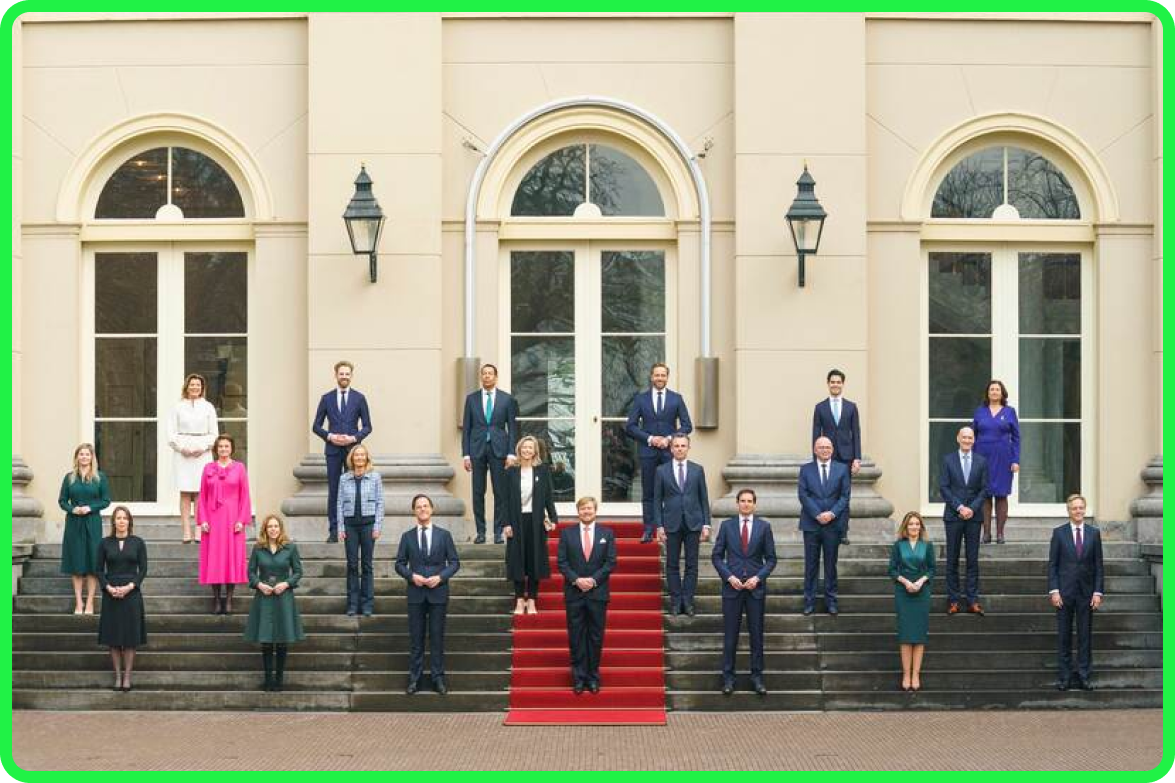New coalition agreement, what about ‘climate’?
The new NL coalition agreement of the Rutte IV Cabinet, an agreement with far-reaching consequences? Or mainly an agreement with interesting plans but few likely climate actions? What does this outline mean for climate & sustainability? Sobolt takes a closer look.
A bit more about the plans
The Netherlands has a new government. After the longest formation ever, the new cabinet was on the ‘bordes’ with King Willem-Alexander on January 10th, 2022. New (and old) faces are present. Sustainability will play a prominent role in this agreement and there will even be a Minister of Climate and Energy. The target in the Climate Act will be tightened up to a 55% CO2 reduction by 2030 and in addition to the existing SDE++ scheme, a climate and transition fund of €35 billion will be set up for the next 10 years. How does Rutte IV intend to realize the climate ambitions? After all, the past period was not very successful and the same parties are in line.
- The policy aims for a 60% reduction in CO2 by 2030
- 70% reduction in 2035 & 80% in 2040
In addition, they will make binding tailor made agreements with the 10 to 20 largest emitters of greenhouse gases. Great idea, but what will this look like? For example, does this mean Schiphol Airport will be closed? Or perhaps Tata Steel will run on hydrogen?
Focus areas
The fact that sustainability is a society-wide theme appears from the variety of the identified focus areas. In broad terms, it comes down to the following initiatives:
- Large-scale acceleration of the construction of new energy infrastructure
- Greener industry and an additional tax on top of European emission rights
- Agricultural sector in harmony with nature
- Expansion and improvement of infrastructure for sustainable transport
- Promotion of renewable energy (and phasing out fossil fuels)
- Climate adaptation in the field of water and heat stress
- Built environment more sustainable construction and better insulation
Nothing new under the sun and a lot of meaningless generalities? Many of the policy plans focus on making the business community greener, but citizens also have to make adjustments. The principle of "the polluter pays" is reflected in the airline ticket tax and the intention to introduce road pricing (also for electric cars). As if we’re going to pollute significantly less of that? And why all that extra bureaucracy when the car is precisely one of the polluting objects that the polluters already pay (albeit little) for? The Dutch government wants to invest in keeping the cities accessible. For this, hubs are being developed. Travelers can easily transfer to a (shared) car, (shared) bicycle, train or metro. This, in combination with investments in public transport, cycling, road and water infrastructure, should (sustainably) improve the connection between city and region. Read a random agreement from the end of last century again and check the few differences?
Energy savings in homes
“The best energy is saved energy.” The motto with which Rutte IV looks at the built environment. According to the new cabinet, homes can and must be more energy efficient. To this end, a long-term National Insulation Program will be initiated. This will run until at least 2030. The aim of this program is to insulate homes faster, smarter and more socially, with the worst insulated homes being tackled first. The Dutch cabinet wants to use standards and positive incentives to encourage landlords to make rented housing more sustainable. Good news?! Although the approach seems to be abstract and following the same route, Sobolt may be able to contribute?
Based on 50,000 heatscans of homes, Sobolt concluded that 54% of these homes can be improved. Awareness of heat leaks is often an important first step. Nice? For more info, check Heatpulse.

In addition to better insulation of homes, the new cabinet will focus on sustainable heat sources to heat homes. Efforts are being made to realize sustainable heat networks in a cost-effective way, to subsidize additional costs for the installation of (hybrid) heat pumps and an obligation to blend green gas into the gas network.
What about solar energy?
In the field of energy generation, the new Dutch government is increasingly focusing on energy sources that don’t emit any greenhouse gases. Sun, wind and geothermal energy are being stimulated and preparations are being made for the construction of 2 additional nuclear power plants. Regarding limited available space, the policy on solar energy mainly focuses on large-scale installation of solar panels on roofs. Solar panels on land are only allowed if multifunctional use of that land is possible. Sobolt actively supports governments in this policy with the solutions Zonnedakje en Park the Sun. Policy makers gain insight into already installed panels and untapped potential. We feel the encouragement to continue with even better applications and services. The cabinet will continue to subsidize the installation of solar panels, but the netting scheme for generated electricity will be phased out from 2023.
Cautiously positive
The Dutch Cabinet Rutte III called itself the greenest ever, but the renewed club seems to have the intention to actually realize it. With direct policy attention from a green minister, and an independent advisory body, the government must have more climate success. Other ministries are expected to take serious steps to achieve climate targets. At the same time, this fragmentation will result in delays. Just draw it out. Although it has been shown in the past that taking action is often more difficult than previously thought, there is now more social support for these changes than before. Moreover, the money seems to keep rolling in The Hague at the moment. In any case, the new government has no lack of ambition on paper, which is a cautious positive sign. To answer the question: how sustainable is Rutte IV's coalition agreement? We're going to actively follow it. Curious? Read the entire coalition agreement here.


 Previous Post
Previous Post Next Post
Next Post